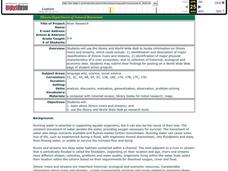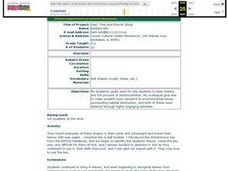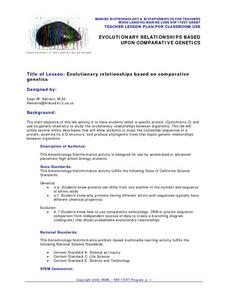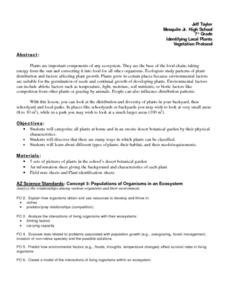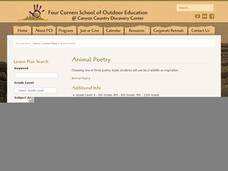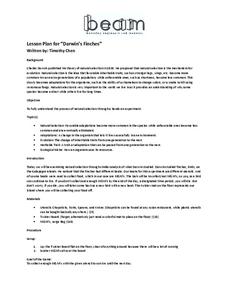Curated OER
Native Species Restoration: Is Saving One Species Hurting Another?
Students investigate the effect of human activities upon the environment. The studying experience encourages students to think about the issues involved in native species restoration.
Curated OER
Aquatic Exotics
Young scholars identify and describe the aquatic exotic species found in Illinois. Using the internet, they research the species origins and discover their effects on native species in the area. They discuss how appropriate it is to...
Curated OER
Great Lakes Food Web
Students identify species and components of a Great Lakes food web. Using note cards, they place themselves in the correct order of the food chain based on the species present. They discuss what they believe happens to various species...
Curated OER
River Research
Students use the internet to research the streams and rivers found in Illinois. Using the information, they identify and describe the rivers and streams along with the physical characteristics of a river ecosystem. They share what they...
Curated OER
Leaf, Tree and Prairie Study
Students are introduced to the topic of Botany and the process of photosynthesis. Using various habitats, they research the amount of destruction it is facing and how to solve the problem. They make a leaf booklet with leaves they find...
Curated OER
Laura Bush
Students read an article about First Lady, Laura Bush's visit to the Midway Atoll, in which she was hoping to focus attention on preserving wild places. They discuss what role they think First Ladies should play while their husbands are...
Curated OER
Volcanoes A-Z
Students examine terminology related to the study of volcanoes, geology, or the ecosystems that surround them. They make note of key words while reading exhibits, interpretive signs, or labels, or hearing them from each other, their...
Curated OER
The Case of the "Lost Gorge:
Middle schoolers examine the case of a map making expedition. In groups, they read a case study on "The Lost Gorge" in the Finger Lakes region of New York state. They examine maps and determine where the error in the map-making occured...
Curated OER
Scientists Write!
Students use a journal to record observations. They make notes about what research may be needed to answer questions that have come up in the field and sketch or make connections in the curriculum. They research bioinformatics and...
Curated OER
Tree of Life
Students study genetics and evolution. They evaluate a group of organisms and estimate their genetic relatedness. Then they use an online program to check the accuracy of their estimations and make a branching phylogenetic tree which...
Curated OER
Evolutionary Relationships Based Upon Comparative Genetics
High schoolers investigate the protein cytochrome c in an attempt to use its genetic chemistry to study possible evolutionary relationships between organisms. The lesson integrates technology with the use computers to perform DNA analysis.
Curated OER
Flour Beetle
Students observe the life cycle of the common flour beetle and make observations of its life stages. They also design and implement an investigation on food preference for the beetle and record data over a period of several months....
Curated OER
What Is An Insect?
Young scholars find and classify insects. They collect insects, study them with a hand lens and identify its body parts. Afterwards, they discus various types of insects and thier Orders such as beetles, butterflies and moths,...
Curated OER
Science: Fossil of a Carbonized Plant
Students classify leaves by shape and margins and use them to create models of plant fossils. By using paper over a leaf, they simulate fossilization of organisms onto sedimentary rocks. Following instructions on worksheets, students...
Curated OER
U.S. History: Antebellum Heroes and Villains
Eighth graders research and write reports on key figures of the Antebellum Period. The projects also include pictures, bibliographies, and timelines about their assigned figure. In addition, 8th graders present oral reports to classmates.
Curated OER
Urban Ecosystems 2: Why are There Cities? A Historical Perspective
Second in a series of five lessons, this lesson encourages preteens to consider cities as urban ecosystems. First, they keep a food diary for a few days. They visit the Natrional Agricultural Statistics Service website for current data...
Curated OER
Urban Ecosystems 4: Metabolism of Urban Ecosystems
Cities are compared to living, breathing, metabolizing organisms. Fourth in a five-part series of lessons, this one focuses on the flow of materials through a city. Links to interesting websites and images make your delivery of...
Curated OER
Reduce, Reuse, Recycle and Respect
Second graders study the vocabulary that is associated with recycling and tell what recycling is. In this recycling lesson, 2nd graders use flash cards and Concentration type games to learn the vocabulary associated with recycling. They...
Curated OER
Soil: Food Mapping
Learners examine the concept of food mapping . In this agriculture lesson, students explore food and agriculture systems in the United States in the past and today. Learners complete food mapping activities.
Curated OER
The Hudson's Ups and Downs
Even rivers have tides. Older elementary schoolers will discuss the Hudson River and how weather, water craft, and the ocean cause tidal fluctuation. They will examine a series of line graphs that depict tidal fluctuation, then analyze...
National Center for Case Study Teaching in Science
A Deadly Passion
Depending on the level of maturity of your class, the case study presented here could be fascinating. It focuses on the mating behavior and post-mating rituals of the Australian redback spider, which involves the female eating the male...
Curated OER
Animal Poetry
Fourth graders write poems that use local wildlife as their inspiration. After a class discussion which produces a list of wildlife that pupils have seen in their town, a review of three types of poetry ensues. They look at how...
Berkeley Engineering and Mentors
Darwin's Finches
Try a twist on the old finch beak and chopsticks activity by using M&Ms on a Twister mat. Spoons, knives, forks, and chopsticks represent beaks and are randomly assigned to your little birds, who must collect as much food as possible...
Curated OER
Use of the Forest in the Economic Evolution of Oakville, Pennsylvania
Students explore forest usage and the ways which it affected the development of Oakville. They identify the technological advances that shaped forest based industries, and the current challenges facing the community of Oakville.
Other popular searches
- Population Ecology
- Animal Ecology
- Human Ecology
- Behavioral Ecology
- Ecology Principles
- Community Ecology
- Pond Ecology
- Ecology Organizations
- Global Ecology
- Ecology Ethics
- Ecology Food Webs
- Ecology and Plants



